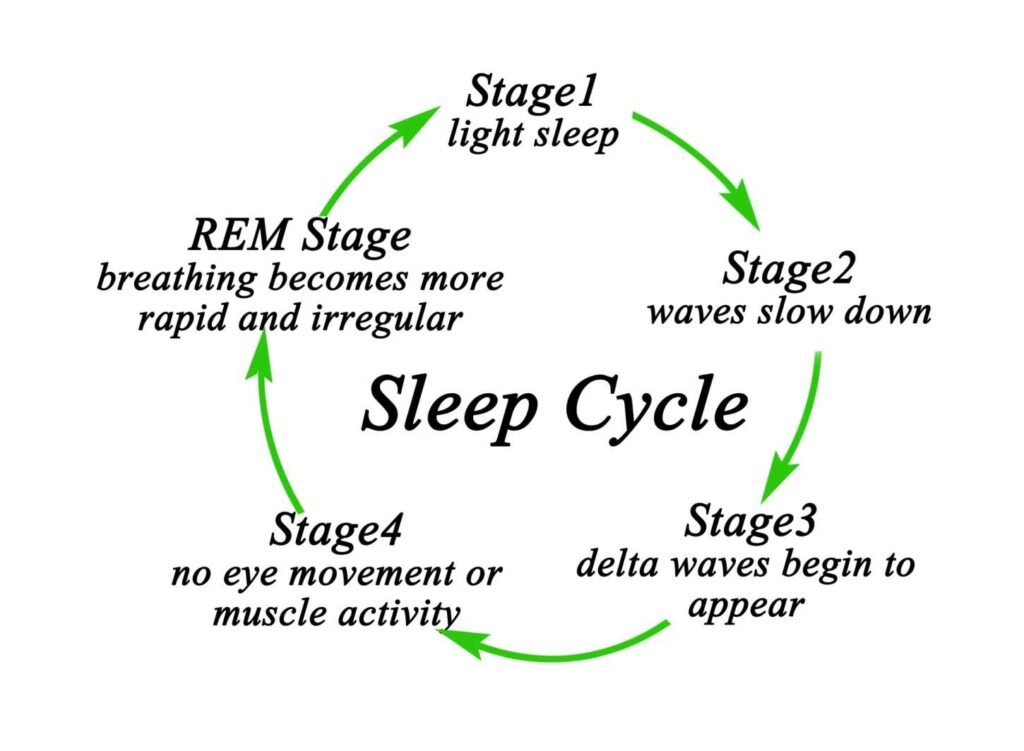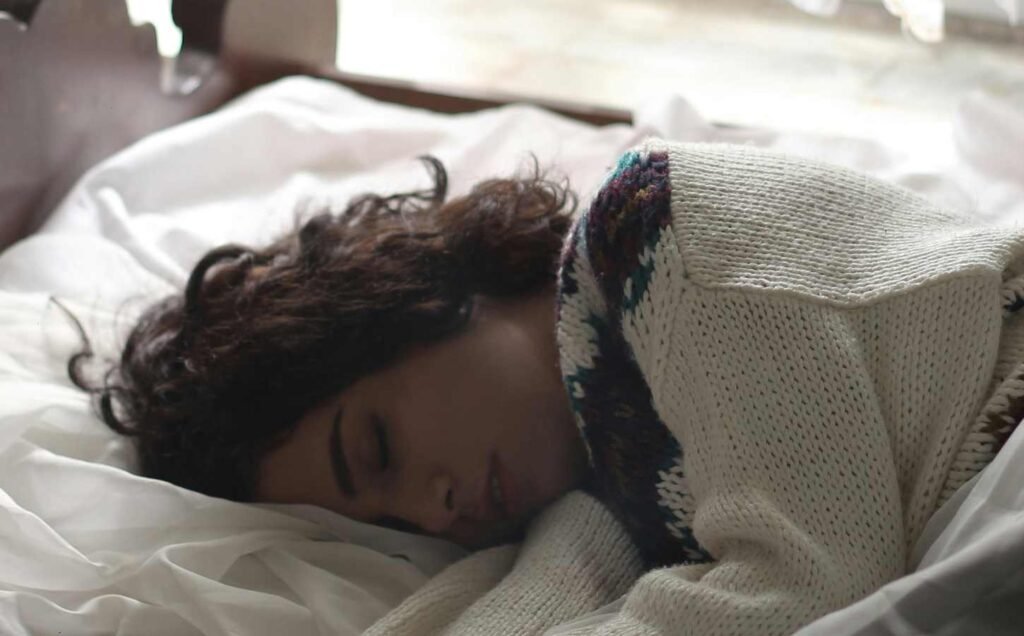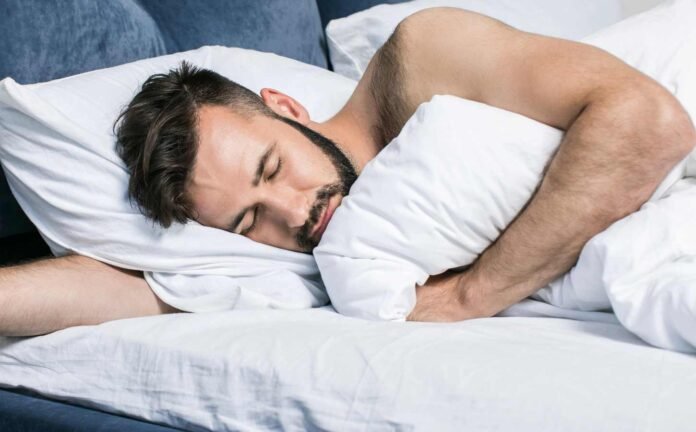Delayed sleep-wake phase disorder (DSWPD) is a sleep disorder that affects the timing of an individual’s sleep-wake cycle.
People with Delayed sleep-wake phase disorder (DSWPD) have a circadian rhythm that is delayed compared to the typical 24-hour cycle. As a result, they have difficulty falling asleep and waking up at the desired times, which can lead to significant disruptions in their daily lives.
The sleep-wake cycle is regulated by the body’s internal clock, also known as the circadian rhythm. This rhythm is influenced by external factors such as light and temperature, as well as internal factors such as hormones and genetics. In individuals with DSWPD, the circadian rhythm is shifted later than normal, causing them to feel sleepy later in the evening and wake up later in the morning. This can make it difficult for them to maintain a regular sleep schedule and can lead to daytime sleepiness, fatigue, and other negative consequences.

Delayed sleep-wake phase disorder is a relatively common sleep disorder, affecting up to 10% of adolescents and young adults. While the exact cause of the disorder is not fully understood, it is believed to be related to a combination of genetic and environmental factors. Treatment options include behavioral changes such as maintaining a regular sleep schedule and avoiding exposure to bright light in the evening, as well as medication and light therapy in some cases.
Understanding Delayed Sleep-Wake Phase Disorder
Defining DSPD
Delayed sleep-wake phase disorder (DSPD) is a circadian rhythm sleep disorder characterized by a delay in the timing of the sleep-wake cycle. This means that individuals with DSPD have difficulty falling asleep and waking up at the desired times, which can lead to excessive daytime sleepiness and difficulties in daily functioning. DSPD is also known as Delayed Sleep Phase Disorder.
Symptoms and Diagnosis
The symptoms of DSPD include difficulty falling asleep at a desired time, difficulty waking up at a desired time, excessive daytime sleepiness, and difficulty functioning during the day. To diagnose DSPD, a sleep specialist may use actigraphy, polysomnography, and a sleep diary to monitor the individual’s sleep-wake cycle.
Epidemiology
DSPD is a relatively common sleep disorder, affecting both adults and children. The prevalence of DSPD is estimated to be around 0.2% to 10% of the general population, with higher rates reported in adolescents and young adults.
Research has shown that DSPD is more common in males than females, and it may be more prevalent in individuals with certain medical conditions, such as depression and bipolar disorder.
It is important to note that DSPD can have a significant impact on an individual’s quality of life, and may lead to difficulties in academic and occupational settings. Treatment options for DSPD include light therapy, chronotherapy, and melatonin supplementation.
Causes and Risk Factors
Genetic Factors
Delayed sleep-wake phase disorder (DSWPD) is believed to have a genetic component. Studies have shown that a mutation in the PER3 gene, which is involved in regulating the body’s internal clock, may be associated with DSWPD. Additionally, a family history of DSWPD or other sleep disorders may increase an individual’s risk of developing the condition.
Environmental Influences
The environment can also play a role in the development of DSWPD. Exposure to artificial light, particularly blue light emitted by electronic devices, can disrupt the body’s natural sleep-wake cycle. Shift work or irregular work schedules can also disrupt the body’s internal clock, leading to DSWPD.
Lifestyle and Behavior
Lifestyle and behavior can also contribute to DSWPD. Alcohol and caffeine consumption, as well as tobacco use, can interfere with sleep quality and disrupt the body’s internal clock. Lack of exercise and poor sleeping habits, such as irregular bedtimes or excessive napping, can also increase the risk of developing DSWPD.
Overall, the causes of DSWPD are complex and multifactorial, involving a combination of genetic, environmental, and lifestyle factors. Identifying and addressing these factors can be key to managing the condition and improving sleep quality.
Associated Conditions
Mental Health Correlations
Delayed sleep-wake phase disorder (DSWPD) is a circadian rhythm disorder that is associated with several mental health conditions. Individuals with DSWPD are at a higher risk of developing depression, bipolar disorder, and other affective disorders. This is because the circadian rhythm plays a crucial role in regulating mood and emotions. Disruptions to the circadian rhythm can lead to mood disorders, which can further exacerbate sleep problems.
Physical Health Considerations
DSWPD is also associated with several physical health considerations. Individuals with DSWPD may experience a higher heart rate and core body temperature during the night, which can lead to sleep disturbances. Additionally, DSWPD is often comorbid with sleep apnea, a condition characterized by pauses in breathing during sleep. This can further disrupt sleep and lead to daytime fatigue.
Comorbid Disorders
DSWPD is often comorbid with other disorders, including attention deficit hyperactivity disorder (ADHD) and chronic insomnia. ADHD is a common neurodevelopmental disorder that is characterized by inattention, hyperactivity, and impulsivity. Individuals with ADHD may have difficulty falling asleep and maintaining sleep, which can exacerbate DSWPD symptoms. Chronic insomnia is a sleep disorder characterized by difficulty falling asleep or staying asleep. Individuals with DSWPD may also experience chronic insomnia, which can further disrupt their sleep-wake cycle.
Health care professionals should be aware of these associated conditions when evaluating patients with DSWPD. A thorough medical history and evaluation of mental and physical health should be conducted to ensure proper diagnosis and treatment.
Treatment and Management
Chronotherapy
Chronotherapy involves gradually adjusting the sleep-wake schedule to align with the desired sleep timing. This treatment plan involves delaying the bedtime by 2-3 hours each night until the desired sleep timing is achieved. This approach is typically performed under the guidance of a sleep specialist and may take several weeks to complete.
Light-Based Therapies
Light therapy is a common treatment for delayed sleep-wake phase disorder. Bright light therapy involves exposure to bright light in the morning to help reset the circadian rhythm. This therapy may involve the use of a light box, which emits bright light that simulates natural sunlight. This therapy can be effective in shifting the sleep-wake schedule earlier.
Pharmacological Interventions
Melatonin supplementation can be used to help regulate the sleep-wake cycle. Melatonin is a hormone produced by the body that helps regulate sleep. Melatonin supplements can be used to help shift the sleep-wake schedule earlier. Sedatives may also be prescribed to help manage symptoms and improve sleep quality.
Lifestyle Adjustments
Lifestyle adjustments can be effective in managing delayed sleep-wake phase disorder. Establishing a regular sleep routine and practicing good sleep hygiene can help regulate the sleep-wake cycle. This includes avoiding caffeine and alcohol before bedtime, establishing a regular bedtime and wake time, and creating a relaxing sleep environment. Exercise can also help regulate the sleep-wake cycle and improve sleep quality.
Clinical practice guidelines recommend a combination of these treatments for the management of delayed sleep-wake phase disorder. Treatment plans should be individualized and developed in consultation with a sleep specialist. With appropriate treatment and management, individuals with delayed sleep-wake phase disorder can achieve better sleep quality and improve their overall quality of life.
Considerations for Specific Populations
Children and Adolescents
Children and adolescents may be particularly vulnerable to the effects of Delayed Sleep-Wake Phase Disorder (DSWPD) due to their developing sleep patterns and social obligations. The onset of puberty can cause a shift in the circadian rhythm, leading to a delay in sleep onset. This can result in difficulty waking up in the morning, excessive daytime sleepiness, and poor academic performance due to the inability to concentrate in class.
It is important for parents and caregivers to establish a consistent sleep schedule and limit screen time before bed. This can help regulate the circadian rhythm and improve sleep quality. Additionally, teenagers should be encouraged to prioritize sleep and avoid staying up late to complete homework or socialize.
Adults and Seniors
Adults and seniors with DSWPD may experience difficulty maintaining a consistent sleep schedule, leading to daytime drowsiness and impaired cognitive function. It is important for individuals with DSWPD to establish a consistent sleep schedule and avoid napping during the day.
In addition, men and women may experience different symptoms of DSWPD. Women may be more likely to experience daytime sleepiness, while men may be more likely to experience difficulty falling asleep at night. It is important for individuals to monitor their sleep patterns and seek medical attention if they experience persistent symptoms of DSWPD.
Overall, individuals with DSWPD should prioritize sleep hygiene and seek medical attention if symptoms persist. By establishing a consistent sleep schedule and avoiding sleep disturbances, individuals with DSWPD can improve their sleep quality and overall well-being.
Prevention and Coping Strategies
Improving Sleep Environment
Creating a comfortable sleep environment can help improve sleep quality for individuals with delayed sleep-wake phase disorder. This includes keeping the bedroom dark, quiet, and cool. Using comfortable bedding and pillows can also help promote a good night’s sleep.
Behavioral Techniques
Behavioral techniques can be effective in managing delayed sleep-wake phase disorder. One such technique is stimulus control therapy, which involves creating a strong association between the bedroom and sleep. This is achieved by limiting activities in the bedroom to sleep and sex only. Another technique is relaxation therapy, which involves practicing meditation, progressive muscle relaxation or deep breathing exercises to help calm the mind and body before sleep.
Timing of Activities
Timing of activities can also play a role in managing delayed sleep-wake phase disorder. It is important to maintain a consistent sleep schedule, even on weekends and holidays. This can help regulate the body’s internal clock. Avoiding naps during the day can also help promote better sleep at night. Exercise during the day can also help promote better sleep, but it is important to avoid exercising too close to bedtime.
Overall, lifestyle changes and good sleep hygiene can help individuals with delayed sleep-wake phase disorder manage their symptoms. Limiting the use of electronics, such as TVs and devices, before bedtime can also help promote better sleep. Avoiding caffeine and alcohol before bedtime can also help promote better sleep. By implementing these strategies, individuals with delayed sleep-wake phase disorder can improve their sleep quality and overall well-being.
Prognosis and Long-Term Outlook
Delayed Sleep-Wake Phase Disorder (DSWPD) is a chronic condition that can significantly impact an individual’s quality of life. While there is no known cure for DSWPD, proper diagnosis and treatment can help manage symptoms and improve overall well-being.
Individuals with DSWPD may struggle with maintaining a regular sleep schedule, leading to fatigue, difficulty concentrating, and other related symptoms. However, with appropriate treatment, many individuals with DSWPD are able to achieve a more regular sleep-wake cycle and experience significant improvement in their symptoms.
It is important to note that DSWPD is often misdiagnosed or overlooked, leading to unnecessary suffering and decreased quality of life. Accurate diagnosis is crucial in developing an effective treatment plan.
For those who are naturally “night owls,” DSWPD may not be a significant cause for concern. However, for individuals experiencing significant fatigue or other related symptoms, seeking medical attention is recommended.
In conclusion, while DSWPD can be a challenging condition to manage, proper diagnosis and treatment can greatly improve an individual’s long-term outlook. By working with a healthcare provider and implementing appropriate lifestyle changes, individuals with DSWPD can achieve a more regular sleep-wake cycle and experience improved quality of life.
Frequently Asked Questions
What are the common symptoms associated with Delayed Sleep-Wake Phase Disorder?
Individuals with Delayed Sleep-Wake Phase Disorder often experience difficulty falling asleep at a socially acceptable time and waking up at a desired time. They may also experience excessive daytime sleepiness, fatigue, and irritability.
What treatment options are available for Delayed Sleep-Wake Phase Disorder?
Treatment options for Delayed Sleep-Wake Phase Disorder include light therapy, chronotherapy, melatonin supplements, and behavioral therapy. Light therapy involves exposure to bright light in the morning to help reset the body’s internal clock. Chronotherapy involves gradually shifting the sleep schedule earlier each day until the desired sleep-wake cycle is achieved. Melatonin supplements can also be used to help regulate the sleep-wake cycle. Behavioral therapy involves implementing consistent sleep and wake times, as well as avoiding stimulating activities before bedtime.
How is Delayed Sleep-Wake Phase Disorder diagnosed?
Delayed Sleep-Wake Phase Disorder is typically diagnosed through a combination of a patient’s reported symptoms and a sleep diary. In some cases, a sleep study may be conducted to rule out other sleep disorders.
What is the relationship between ADHD and Delayed Sleep-Wake Phase Disorder?
Research suggests that individuals with ADHD may be more likely to experience Delayed Sleep-Wake Phase Disorder. However, the exact relationship between the two conditions is not fully understood.
Can Delayed Sleep-Wake Phase Disorder affect adults differently than children?
Delayed Sleep-Wake Phase Disorder can affect both adults and children, but the symptoms and impact on daily life may differ. Adults may experience more difficulty maintaining regular work schedules, while children may struggle with school attendance and performance.
What strategies can improve living with Delayed Sleep-Wake Phase Disorder?
Strategies that can improve living with Delayed Sleep-Wake Phase Disorder include maintaining a consistent sleep schedule, avoiding stimulating activities before bedtime, and implementing relaxation techniques such as meditation or deep breathing exercises. It may also be helpful to seek support from a healthcare provider or sleep specialist.
MaryRuth Organics Sleep Gummies Without Melatonin Review: Do They Work?

These gummies are designed to promote relaxation and support sleep quality for adults. Unlike many other sleep aids, they don’t contain melatonin, so you won’t wake up feeling groggy or drowsy.
Continue reading: MaryRuth Organics Sleep Gummies Without Melatonin
Reclaiming Deep Restful Sleep: The Magnesium Deficiency Solution

Discover the natural solution to deep, restful sleep and magnesium deficiency through the efficacy of PUREDOSE® Micelle Liposomal Magnesium. This superior bioavailable supplement promotes optimal sleep support and overall well-being.
Continue reading: Reclaiming Deep Restful Sleep
Understanding Circadian Rhythm: The Body’s Natural Clock Explained

Circadian rhythms are physical, mental, and behavioral changes that follow a roughly 24-hour cycle, responding primarily to light and darkness in an organism’s environment. These rhythms are driven by an internal biological clock, which is known as the circadian clock or the biological clock.
Continue reading: Understanding Circadian Rhythm





